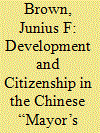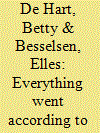|
|
|
Sort Order |
|
|
|
Items / Page
|
|
|
|
|
|
|
| Srl | Item |
| 1 |
ID:
179272


|
|
|
|
|
| Summary/Abstract |
This article applies Distelhorst and Fu’s (2019) typology of citizenship performances to an original sample of 200 online Mayor’s Mailbox letters to examine how scripts of citizenship differ between richer and poorer areas of China. Using a mixed-methods approach, I find that letters in more developed areas are significantly less likely to present the writer as a submissive subject, but no more likely to frame complaints in terms of rights and legality. I also find that many letter writers behave as “constructive citizens” by stressing their interest in helping the authorities improve local governance. These findings challenge linear understandings of the value shift that follows development, and suggest that the focus on contention in the literature on citizenship under authoritarianism overlooks other, more cooperative forms of political participation in consolidated autocracies.
|
|
|
|
|
|
|
|
|
|
|
|
|
|
|
|
| 2 |
ID:
177891


|
|
|
|
|
| Summary/Abstract |
Academic literature has studied the legal consciousness of common citizens: the way ordinary people think and talk about law in their everyday lives. Building on this literature, we explore how Dutch female citizens with a migrant partner experience the impact of migration law on their everyday lives. We questioned how legal consciousness is linked to intimate citizenship, thus demonstrating how ‘private’ matters such as intimate relationships, marriage, and family have a profound impact on citizenship. Based on two sets of interviews, conducted in 2000 and 2016, we were able to determine how these women, despite being citizens formally, experienced the profound impact of increasingly restrictive family reunification policies. Contrary to our expectations, female sponsors continued to express considerable support for restrictive migration law. In performing intimate citizenship, they claimed an exception from the strict application of the rules for their particular family situation, rather than radical change.
|
|
|
|
|
|
|
|
|
|
|
|
|
|
|
|
| 3 |
ID:
112378


|
|
|
|
|
| Publication |
2012.
|
| Summary/Abstract |
Despite recent legislation and regulations to protect homeowners' rights in the process of urbanization, forced eviction remains one of the most prevalent causes of violence in contemporary China. This article examines the capacity of residents of Chinese cities to protect their property rights using new media to produce alternative discourses on law in the urbanization process. Fieldwork conducted in Beijing from 2007 to 2008, a period during which the national capital underwent massive development schemes for the 2008 Summer Olympic Games, shows that homeowners create virtual precedents, backed not by the authority of the court, but by that of the media. Evictees of so-called dingzihu (nail-houses) facing chaiqian (demolition and relocation) develop arguments based on the 2007 case of Wu Ping, the first new media superstar in (post-)socialist China. The article, following post-structuralist formulations, develops a theory of 'legal surrealism' characteristic of the position of law in reform-era China. Whereas social media is equated with revolution elsewhere, in China, the lesson of the role of new media in effecting social change may be one of limitation. While digital mass communication technologies may assist individual 'victories', challenges to eviction face both intrinsic and extrinsic obstacles for collective action.
|
|
|
|
|
|
|
|
|
|
|
|
|
|
|
|
|
|
|
|
|